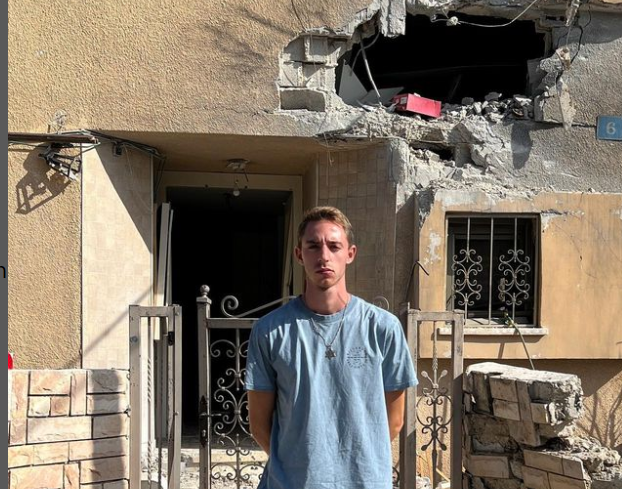
Israel

Israel advocacy essential, but it’s a minefield
While Israel is trying to recover from the horrific events of 7 October, a frightening war is being fought on the social media battlefield, says David Rebel, a social media influencer.
“What’s more devastating is that the battlefield isn’t only in Gaza, but also on social media,” said Rebel, who works with Israel Is, a non-government organisation of young friends who have been telling their stories about Israel since 2017.
Israel Is was started by a group of friends after completing their army service, travelling the world, and discovering that people have a lot of misconceptions about Israel. Israel Is dedicates itself to enhancing Israel’s global image through the voice of its people.
“We in Israel understand the scale of the disaster that’s happening on social media, and we understand that all the hatred and antisemitism directly affects Jewish people in the diaspora. We’re one people, we’re Jewish people, and we need to understand that the war on social media is important to defend,” Rebel said, speaking on a South African Zionist Federation (SAZF) webinar in collaboration with Israel Is on 16 November. The webinar focused on navigating the social media battlefield.
“While we pray for the protection and peace of Israel and the immediate release of hostages, it’s now more important than ever to counteract the social media distortion of Israel,” said Stacey Dembo, SAZF executive director.
On social media, Jews “face challenges from BDS [the Boycott, Divestment, Sanctions organisation] and the so-called anti-Zionist movement”, Rebel said. They try to portray their antisemitism as hatred for Israel, but it’s clear to see. “As we can see, there has been a 300% increase in antisemitism around the world, so it’s not about Israel. This is a disaster, something that starts online is being taken to the streets. Jewish schools in France, Italy, the United States, and even in Israel, are being targeted,” Rebel said.
“The people who started Israel Is used their own experience to start the influencer organisation, and we continue with this idea. We believe a personal story from a person from a certain country can change a lot. Sharing a personal story is better than sharing an article or statement from the spokesperson of the Israel Defense Forces because a personal story is more understandable to the general public,” Rebel said.
“One of the tasks in hasbara is to humanise Israel. There are a lot of people who talk about facts, but unfortunately, facts don’t matter to some people. So, we need to bring in personal stories. If you look at Palestinian propaganda, they don’t use facts, they use only emotions. We need to humanise Israel by using our personal stories,” Rebel said.
Rebel went on to give some useful dos and don’ts about social media advocacy. “Avoid sharing information from unreliable sources. Telegram is fake-news heaven,” he said, pointing out that if you open a site purporting to be a news channel and see a lot of low-quality videos, be suspicious as it’s likely to be fake. The problem is that if you land up posting these videos that you were led to believe are from Hamas now and are in fact from Syria in 2015, and they are proven to be fake, you’re caught in a lie.
“We need to double-check. If we’re caught in a lie, it can get worse.” If you’re caught putting up fake information, how do people trust you when the information is correct, he asks. “We mustn’t share content that could be used against our interests. Avoid responding to clear anti-Israel or antisemitic content, rather block and report those profiles. You’re not going to change their position if they have already been poisoned by Palestinian propaganda. Avoid graphic content that might be hard to watch or can be removed. If we share graphic content – such as dead bodies – without explanation, the message we want to transfer is lost,” Rebel said.
In terms of what we should do, Rebel suggested sharing testimonies of survivors and residents through photos, stories, and videos. “Survived to Tell is a great example as there are no graphic images, with personal stories with emotions,” he said. Rebel emphasised that we need to share our truth respectfully, and that we must prioritise our shared values. “We’re fighting for the restoration of peace. The intention is to fight Hamas in the same way the world fights ISIS,” he said.
“We don’t need to exaggerate with over posting or oversharing on social media. Three to five stories a day can start to look like propaganda, which is something we need to avoid,” Rebel said.
Rebel suggested sharing reliable news sources like the Jerusalem Post, Times of Israel, and StandwithUs, as well as posts by commentators Uri Cohn, Noa Tishby, and Yoseph Haddad, among others. If we see a post that could use some more attention, tag news organisations and use viral hashtags such as #HamasisIsis, #Israelunderattack, #bringthemback or #Westisnext in getting people’s attention to social media.
“You don’t need to turn your Instagram, Facebook or Twitter page into an Israel advocacy page. You can combine Israeli advocacy with your normal content,” he said.










